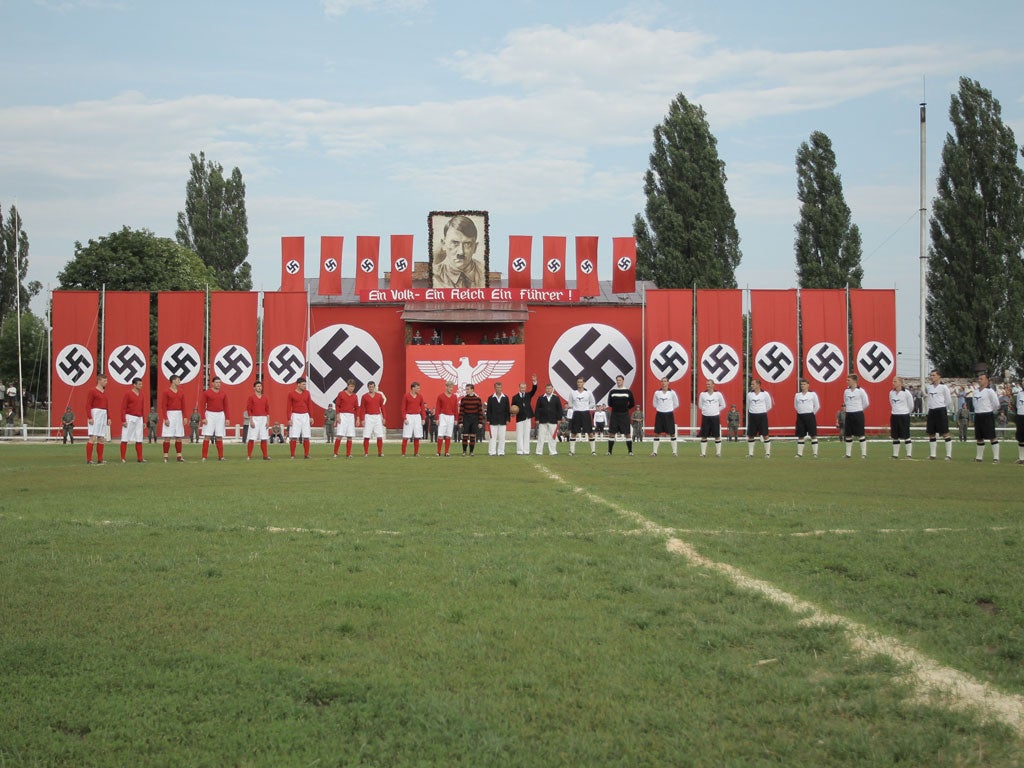
Your support helps us to tell the story
From reproductive rights to climate change to Big Tech, The Independent is on the ground when the story is developing. Whether it's investigating the financials of Elon Musk's pro-Trump PAC or producing our latest documentary, 'The A Word', which shines a light on the American women fighting for reproductive rights, we know how important it is to parse out the facts from the messaging.
At such a critical moment in US history, we need reporters on the ground. Your donation allows us to keep sending journalists to speak to both sides of the story.
The Independent is trusted by Americans across the entire political spectrum. And unlike many other quality news outlets, we choose not to lock Americans out of our reporting and analysis with paywalls. We believe quality journalism should be available to everyone, paid for by those who can afford it.
Your support makes all the difference.Ukrainian authorities have blocked the release of a film about Soviet footballers who defied Nazi Germany amid fears it could ignite explosive emotions just weeks before the country co-hosts the Euro 2012 tournament.
The Match depicts the 1942 "Death Match" in which top Kiev footballers trounced a team of Nazi occupiers and reportedly paid with their lives.
Officials fear the film which extolls the heroism of Ukrainian soccer players but portrays many Kiev residents as Nazi collaborators, would teach Ukrainian audiences the wrong image of their country and history.
Some experts also fear that it may stoke hostility towards German players and fans as Ukraine hosts several games played by Germany's national team.
The movie tells the story of the August 9, 1942, match, which pitted a Wehrmacht team against players from Kiev's top club Dynamo and other athletes. The Ukrainian team won 5-3 despite reported warnings from the SS that they must lose to their occupiers. Most team members were soon arrested.
"Some things are worth dying for," the actor playing team captain Nikolai Ranevich says in the film, his eyes filling with tears, as he convinces his team to beat the Nazis in a show of resistance and patriotism.
A Soviet journalist dubbed the game the "Death Match" and Soviet authorities long cultivated the legend that the entire team was executed by the Nazis soon afterwards. A monument to those players now stands outside the Dynamo stadium.
But historians now say that while defeating the Nazi team was undoubtedly courageous, there is no evidence to suggest all the players were executed in revenge.
Nine of the players were arrested about a week after the match. One soon died in custody and three others were shot in a Kiev concentration camp six months later, according to Volodymyr Prystaiko, a former Soviet security officer who wrote a book on the match.
German investigators concluded in 2005 there was no evidence linking the death of the three players to the match.
The film's distributor wanted The Match to premiere in Ukraine on May 3 and the state cinema agency was to announce its decision on whether to approve the movie last week. But agency spokeswoman Larisa Titarenko said yesterday the regulator would take another 25 working days to analyse the film.
Yaroslav Pidhora-Gvyazdovskiy, a member of the expert commission reviewing The Match, says he recommended banning the film because it promotes ethnic strife. Most of the characters who collaborate with the Nazis speak Ukrainian while the admirable characters in it speak Russian and fearlessly oppose the invaders, he said.
Independent movie critic Volodymyr Voitenko said the film should be banned.
"It's ideological propaganda, which is part of Russia's neo-imperialist policy," he said. "It's a political question and the state must decide whether to allow being spat in the face or not."
But movie producer Dmitry Kulikov accused Ukrainian movie officials of bowing to pressure from "radical nationalist groups".
"There is nothing anti-Ukrainian about this movie," he said from Moscow. "We made a movie about the heroic deed of Ukrainians and Kiev residents during the war."
Some experts also fear the movie - in which courageous Ukrainian players oppose German-speaking Nazi athletes against the backdrop of giant swastikas - may stoke anti-German feelings ahead of the June 8-July 1 Euro 2012 tournament.
Political analyst Volodymyr Fesenko said the film could incite aggressive fans.
"There always are people - hooligans - who use football to spill out their aggression and some of those people may be influenced by it," he said.
Join our commenting forum
Join thought-provoking conversations, follow other Independent readers and see their replies
Comments